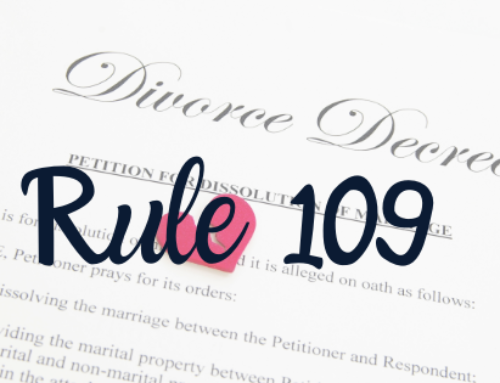The decision to get a divorce is never an easy one. Most people do not even begin to consider it as a possibility until they have tried every other option they can think of to save their marriage. A divorce can be a lengthy process that is both emotionally and financially strenuous.
This article will give you an understanding of how the divorce process in Utah works and answer some of the most frequently asked questions about it.
Starting a divorce
A divorce is started when one spouse files a petition for divorce with the court. The petition is served to the other spouse, who has 21 days after service to respond to the petition with an answer. The spouse who files the petition is called the petitioner and the spouse who files the answer is called the respondent.
In order to file for divorce, the petitioner has to pay filing fees to the court as well as pay fees to have the petition served to the respondent. If the parties have minor children, they are required to attend co-parenting education courses designed to help them adjust to the divorce and think of what is best for the children. The parties must also wait 30 days from the time the petition is filed until the divorce can become final.
FAQs about divorce in Utah
1. What grounds should I list for divorce?
The most common grounds for divorce is “irreconcilable differences,” which removes having to prove who is at fault for the divorce. In Utah, if one spouse wants to get divorced, irreconcilable differences is sufficient grounds for the judge to grant the divorce. There are other grounds for divorce in Utah which may be used. These other grounds for divorce are listed in Utah Code Ann §30-3-1 and include the following:
(a) impotency of the respondent at the time of marriage;
(b) adultery committed by the respondent subsequent to marriage;
(c) willful desertion of the petitioner by the respondent for more than one year;
(d) willful neglect of the respondent to provide for the petitioner the common necessaries of life;
(e) habitual drunkenness of the respondent;
(f) conviction of the respondent for a felony;
(g) cruel treatment of the petitioner by the respondent to the extent of causing bodily injury or great mental distress to the petitioner;
(h) irreconcilable differences of the marriage;
(i) incurable insanity; or
(j) when the husband and wife have lived separately under a decree of separate maintenance of any state for three consecutive years without cohabitation.
There are many different reasons to file for divorce in Utah. All reasons would fit within “irreconcilable differences.” However, if you want to use one of the other grounds for divorce, it is a good idea to consult with a lawyer.
2. What is a no-fault divorce and is it available in Utah?
A no-fault divorce means that the court grants the divorce without making any inquiry or findings into whose fault it is that the marriage is dissolving. Utah recognizes and grants no-fault divorces.
To have a no-fault divorce, the grounds for divorce would need to be listed as “irreconcilable differences.” If this is listed as the grounds for the divorce, the court will grant the divorce without making any further inquiry about the reasons for the divorce.
The other grounds for divorce would cause the Petitioner to prove factual evidence to support the listed reason for the divorce. This could result in making the divorce process more complicated and expensive, or worse, having your petition denied. In other words, if the Petitioner is not successful in proving facts supporting the other grounds, the court would not grant the divorce at all.
This is why a no-fault divorce is the preference and why the grounds of irreconcilable differences is most commonly used.
You should be aware, however, that the court may inquire into the circumstances of the marriage when it addresses other issues, particularly custody of minor children and alimony.
3. What’s the difference between a contested and uncontested divorce?
In a contested divorce, spouses disagree over how to resolve certain issues that are part of the divorce process, such as child custody arrangements or how assets are split between them. In these cases, they may require the court to make the decision for them. Contested divorces take more time and can end up going to trial if the parties can’t agree on anything.
Unlike a contested divorce, an uncontested divorce is where the spouses are able to agree on how to resolve all of the issues in their divorce. An uncontested divorce is much quicker, is less expensive, and is often less stressful on both the spouses and the children.
In an uncontested divorce, the parties agree on everything and it doesn’t need to go to trial. In these cases, we charge a one-time flat fee where we draft the agreement of the spouses and all the other divorce paperwork which is then submitted to the court. It is generally a very smooth and simple process and the divorce is final shortly after the 30-day waiting period expires.
4. What is mediation, and will we have to go to mediation?
Mediation is the process of hiring a neutral third party to help the parties reach an agreement on the issues in the divorce. Under Utah law, if the parties are unable to agree on the terms to resolve their divorce, they must attend at least one mediation session and split the costs of the mediator.
During mediation, the mediator meets with both parties and their attorneys, either together or separately, to learn about the issues in the case. Once the mediator has a good understanding of the case, they begin assisting the parties with negotiating an agreement. The mediator helps the parties discuss different options and alternative solutions to help them agree on a resolution. Most couples are able to reach an agreement during mediation.
There is no obligation to reach an agreement at mediation. The process is more informal. The mediator is not the judge and does not have the authority to make a decision for the parties. Mediation is an opportunity for the divorcing couple to maintain control of the outcome regarding the issues in their divorce case. If they reach an agreement, the agreement is put into writing and the parties sign the agreement before they leave the mediation. This results in a binding agreement that is filed with the court to fully resolve the divorce.
If the parties do not reach an agreement, the mediator has no authority to impose a resolution on the parties. If this is the case, the parties proceed to a trial in which a judge will decide how the issues in their divorce are resolved.
5. What are the issues involved in a divorce case?
All divorce cases are unique and have their own sets of issues to resolve, but there are several issues that are the same in most divorce cases. Obviously if a couple doesn’t have children, the custody and child support issues will not need to be addressed. The major issues addressed in a divorce include the following:
- Legal and Physical custody of minor children
- Parent-time or Visitation schedules
- Child Support
- Medical and Healthcare expenses
- Daycare expenses
- Alimony
- Division of Personal Property
- Division of equity in the marital home or other real estate or Real Property
- Division of Marital Debts
- Tax consequences such as claiming children as exemptions
- Communication between parties after the divorce
10. What is the waiting period for a divorce?
If the parties agree on all the terms of the divorce and take the divorce classes quickly, the substance of the divorce can be worked out in a couple of weeks. Even if the parties come to an agreement quickly, they must wait for the 30-day waiting period to expire.
If the parties are unable to agree on the terms of the divorce and have a multi-day trial, the divorce can take two years or more.
11. How much will a divorce cost?
The cost of the divorce depends on the number of issues the parties disagree on and how bitter the disagreements are. If the parties agree on all the terms of the divorce, the divorce may cost $2,000 or less. If the parties disagree on every term and go to trial on each issue, the divorce may cost $20,000 or more.
Ask us about our flat fee for Uncontested Divorce cases. Call or text 801-544-5306.
12. Is there an advantage to filing first?
In the past, there was sometimes an advantage to filing for divorce first, especially for women. This is no longer the case, and it does not matter who files with the court first.
13. Should I get a protective order against my spouse?
Protective orders are separate from divorce actions. In order to obtain a protective order, you must show that your spouse threatened or caused physical abuse or domestic violence.
Occasionally, parties attempt to get an advantage in a divorce case by obtaining a protective order. This is improper and may end up hurting your credibility with the court in the divorce case.
14. Can I file for divorce on my own?
Yes, you can file for divorce on your own through Utah’s Online Court Assistance Program (OCAP). You have access to the forms you need. However, if your case is more complicated and not straightforward, it’s best to hire a lawyer.
If you have questions about filing for divorce or are thinking about filing, our family lawyers want to help you. For years we’ve been helping clients with their divorce cases in Utah. Call or text our office today at 801-544-5306 for a free consultation to see how we can help you too.
If you can’t afford a lawyer and want to consider lower-cost options, or you would like help filing divorce on your own, check out the resources offered at Utah Legal Coach.







Leave A Comment